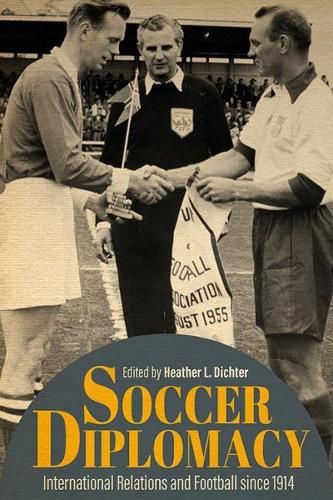Readings Newsletter
Become a Readings Member to make your shopping experience even easier.
Sign in or sign up for free!
You’re not far away from qualifying for FREE standard shipping within Australia
You’ve qualified for FREE standard shipping within Australia
The cart is loading…






This title is printed to order. This book may have been self-published. If so, we cannot guarantee the quality of the content. In the main most books will have gone through the editing process however some may not. We therefore suggest that you be aware of this before ordering this book. If in doubt check either the author or publisher’s details as we are unable to accept any returns unless they are faulty. Please contact us if you have any questions.
Although the game is known by many names around the world - football, futbol, Fussball, voetbal - soccer is a universal language. Throughout the past century, governments have used soccer to further their diplomatic aims through a range of actions including boycotts, carefully orchestrated displays at matches, and more. In turn, soccer organizations have leveraged their power over membership and tournament decisions to play a role in international relations.
In Soccer Diplomacy, an international group of experts analyzes the relationship between soccer and diplomacy. Together, they investigate topics such as the use of soccer as a tool of nation-state - based diplomacy, soccer as a non-state actor, and the relationship between soccer and diplomatic actors in subnational, national, and transnational contexts. They also examine the sport as a conduit for representation, communication, and negotiation.
Drawing on a wealth of historical examples, the contributors demonstrate that governments must frequently address soccer as part of their diplomatic affairs. They argue that this single sport - more than the Olympics, other regional multisport competitions, or even any other sport - reveals much about international relations, how states attempt to influence foreign views, and regional power dynamics.
$9.00 standard shipping within Australia
FREE standard shipping within Australia for orders over $100.00
Express & International shipping calculated at checkout
This title is printed to order. This book may have been self-published. If so, we cannot guarantee the quality of the content. In the main most books will have gone through the editing process however some may not. We therefore suggest that you be aware of this before ordering this book. If in doubt check either the author or publisher’s details as we are unable to accept any returns unless they are faulty. Please contact us if you have any questions.
Although the game is known by many names around the world - football, futbol, Fussball, voetbal - soccer is a universal language. Throughout the past century, governments have used soccer to further their diplomatic aims through a range of actions including boycotts, carefully orchestrated displays at matches, and more. In turn, soccer organizations have leveraged their power over membership and tournament decisions to play a role in international relations.
In Soccer Diplomacy, an international group of experts analyzes the relationship between soccer and diplomacy. Together, they investigate topics such as the use of soccer as a tool of nation-state - based diplomacy, soccer as a non-state actor, and the relationship between soccer and diplomatic actors in subnational, national, and transnational contexts. They also examine the sport as a conduit for representation, communication, and negotiation.
Drawing on a wealth of historical examples, the contributors demonstrate that governments must frequently address soccer as part of their diplomatic affairs. They argue that this single sport - more than the Olympics, other regional multisport competitions, or even any other sport - reveals much about international relations, how states attempt to influence foreign views, and regional power dynamics.